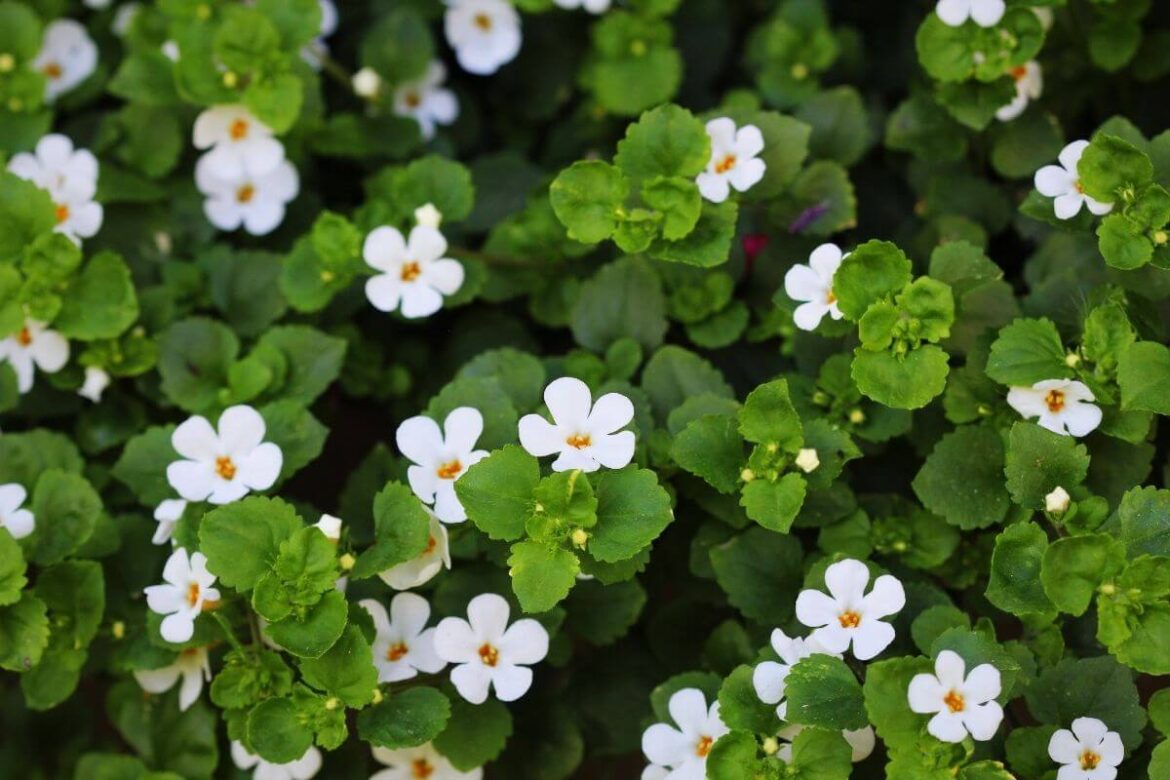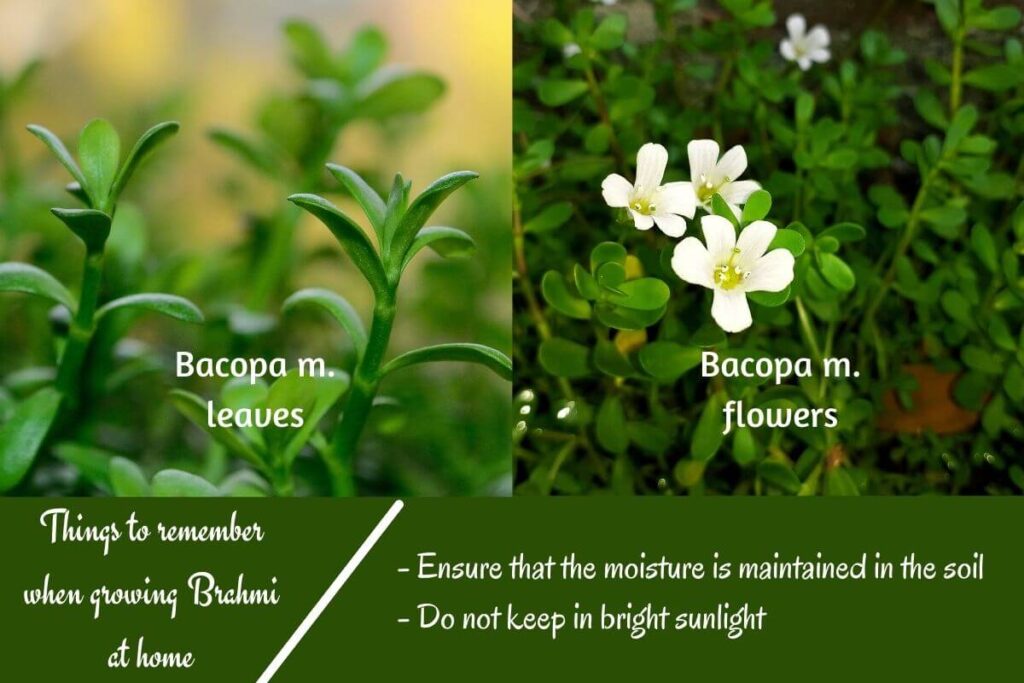Bacopa Monnieri, a medicinal herb that is native to India, had extensive use in ancient Indian medical systems including Ayurveda, Unani, and Siddha.
Bacopa monnieri is commonly called Brahmi in Ayurveda, Jal Brahmi in Unani medicine and Pirammi Valukkai in Siddha medicine. The Sanskrit name Brahmi means “expands consciousness”. Bacopa m. is also referred to by several other names such as andri, Herpestis monniera, herpestis herb, Indian pennywort, water hyssop, and herb of grace. Do not confuse this with gotu kala, which also has a common name Brahmi.
The herb offers several benefits; more popularly it is promoted for its use to improve memory and treat anxiety, stress, and ADHD in children. The other conditions the herb can possibly treat are Inflammation, Ease of Joints (Arthritis & Rheumatism), IBS, Bronchial problems, Asthma, Mental fatigue, Epilepsy, and Insomnia.
This article intends to provide you with information on the origin, habitat, medicinal properties, conditions it can treat, availability, and precautions of usage of this wonderful herb.
Habitat And Physical Features
Bacopa m. is a creeping, prostrate, somewhat succulent perennial that grows naturally in moist or wet places, and flourishes in tropical and subtropical regions of the world.
The leaves are bright green and are succulent, oblong, and thick. The flowers are small and white. Bacopa m. flowers and produces fruits throughout the growing season.
Scientific Research
Bacopa m. has been found to have adaptogenic, anticancer, antidepressant, antioxidant, astringent, anxiolytic, cardiotonic, cholinergic (activated, stimulated, or transmitted by choline/acetylcholine), cognitive-enhancing, diuretic, mildly laxative, refrigerant, sedative, and vasoconstrictive properties. Bacosides compounds are believed to be responsible for these benefits.
Use of Brahmi Improves Brain Functions In Alzheimer Patients – Study Finds:
Most of the recent clinical studies on Bacopa m. investigated its effect on cognition, memory, anxiety, and depression in healthy volunteers & Alzheimer’s patients. In a 2011 open-label, prospective, uncontrolled, non-randomized study, 39 Alzheimer’s patients (60-65 years) were given 300 mg Bacognize® twice daily for six months.
Patients showed significant improvements in various areas, including attention, the orientation of person, place, and time, and in reading, writing, and comprehension. Bacopa m. significantly improved memory acquisition and retention in old age people.
You Might Also Like:
Traditional Uses
Being native to India, Brahmi has been traditionally used in several parts of India and Nepal as well. Some of them are,
- Native people of Nepal use the fresh juice of Brahmi leaves to treat burns
- The Bhil tribes from Rajasthan use the boiled leaves on the abdomens of women to relieve postnatal pain, and the poultice made from warmed leaves to alleviate swelling
- In Maharashtra, tribal inhabitants believe that eating five leaves for a period of one month can improve stuttering
Medicinal Benefits:
All parts of the plant, either fresh or dried, have extensive medical uses. The Indian traditional medicine systems (Ayurveda, Siddha, and Unani) have several preparations made primarily from the whole dried plant (i.e. root, stem, leaf, flower, and fruit) that can treat various health problems.
- The leaves, in particular, treat asthenia (lack or loss of strength), nervous breakdown, threadworms, and other low adynamic conditions (those characterized by loss of strength or vigour).
- A poultice made of the boiled plant (aerial parts and root) when topically applied on the chest and throat can treat children with acute bronchitis and other coughs.
- Both the fresh juice and a paste made of the leaves when topically applied relieves the pain of inflamed joints, and precisely, the joint pain caused by arthritis.
Apart from health benefits, Brahmi is used to improve skin health and scalp health as well.
- Brahmi has a commendable cooling effect on your scalp; hence, applying Brahmi oil on your scalp can reduce hair loss by strengthening hair follicles and can also reduce dandruff
- The antioxidants present expels toxins from your body thus nourishing your skin and giving it a glow
Brahmi In Ayurveda:
Bacopa m. is one of the vital ingredients in many Ayurveda preparations. According to Ayurveda, it is a Rasayana herb (rasa: primordial tissue or plasma; Ayana: path).
Generally, Rasayana herbs,
- prevent ageing
- re-establish youth
- prevent disease
- promote healthy longevity
- strengthen life, brain, and mind.
Bacopa m. is indicated for treating skin diseases, fever, edema, anaemia, increased frequency and turbidity of urine, and psychological disorders. It is used in Ayurveda as a brain tonic that can help manage anxiety, poor cognition, and lack of concentration. Also, Ayurveda uses the plant to cure digestion problems.
Brahmi In Siddha And Unani:
In Siddha medicine, Brahmi treats constipation, painful urination (dysuria), edema, nervous debility, and poor memory. It finds use in Unani medicine for the treatment of brain and nervous weaknesses.
Can You Grow Brahmi At Home?
Yes, it is quite easy to grow Bacopa m. (Brahmi) at home. When this herb is a part of your home garden, using Brahmi regularly becomes easy.
- You can eat 2-3 leaves every day for general health
- Brew a few leaves into a soothing tea
- Dry the entire plant including roots under shade; grind into a fine powder; take a pinch of this powder along with honey every day
- Boil leaves of Brahmi with a base oil to make an excellent hair tonic
Can You Take The Capsules?
Brahmi/Bacopa m. has remarkable medicinal properties that can treat various health issues. However, the efficacy of the treatment using Bacopa m. does not have sufficient scientific evidence. Hence, even though Bacopa m. is available in capsules, you must refrain from taking the drugs without consulting your doctor.
However, it is much safer to use Brahmi in your cooking and reap several of the medicinal benefits it offers. You can make soups with Brahmi leaves, and use chopped leaves in your raw salad. Visit here for more recipes. There might be several other recipes available on the internet, and you can try them out as well.
Possible Side Effects
Bacopa m. can possibly cause one or more of the following side effects in a few.
- Dry mouth
- Nausea
- Bloating
- Stomach ache
- Diarrohea
- Fatigue
Contraindications
The safety of Bacopa drug use is not established in pregnant women and nursing mothers. Also, the dosage is not sufficiently researched, and hence appropriate care should be taken when used in children.
If you are taking medications for pre-existing conditions, you must consult your doctor before taking Bacopa m. supplements.
The Final Word
Bacopa Monnieri (Brahmi) is unarguably an amazing herb that offers a host of health benefits. However, as there is no substantial scientific evidence, it is best to take expert advice before using Bacopa m.
Edited by love4wellness | Images from canva.com
References:
Puri HS. Rasayana; Ayruvedic Herbs for Longevity and Rejuvenation. London: Taylor and Francis, Inc.; 2003.
Kapoor L, ed. CRC Handbook of Ayurvedic Medicinal Plants. Boca Raton, FL: CRC Press; 1990.
Manandhar NP. Plants and People of Nepal. Portland, OR: Timber Press; 2002.
Parrotta J. Healing Plants of Peninsular India. New York: CABI Publishing; 2001.
Williamson EM, Hooper M. Major Herbs of Ayurveda. New York: Churchill Livingstone; 2002.
Ayurveda Pharmacopoeia Committee. Brahmi (Whole plant). The Ayurveda Pharmacopoeia of India, Part I, Volume II, First Edition New Delhi (India): Department of Ayurveda, Yoga & Naturopathy, Unani, Siddha and Homoeopathy (AYUSH), Ministry of Health & Family Welfare, Government of India. 1999.
Unani Pharmacopoeia Committee. Jal Brahmi (Whole plant). The Unani Pharmacopoeia of India, Part I, Volume IV. New Delhi (India): Department of Ayurveda, Yoga & Naturopathy, Unani, Siddha and Homoeopathy (AYUSH), Ministry of Health & Family Welfare, Government of India. 2007.
Siddha Pharmacopoeia Committee. Pirammi Valukkai (Whole plant). The Siddha Pharmacopoeia of India, Part I, Volume I, First Edition New Delhi (India): Department of Ayurveda, Yoga & Naturopathy, Unani, Siddha and Homoeopathy (AYUSH), Ministry of Health & Family Welfare, Government of India. 2008.
Goswami S, Saoji A, Kuman N, Thawani V, Tiwari M, Thawani M. Effect of Bacopa monnieri on cognitive functions in Alzheimer’s disease patients. International Journal of Collaborative
Brahmi recipes – 9 recipes https://cookpad.com/in/search/brahmi

